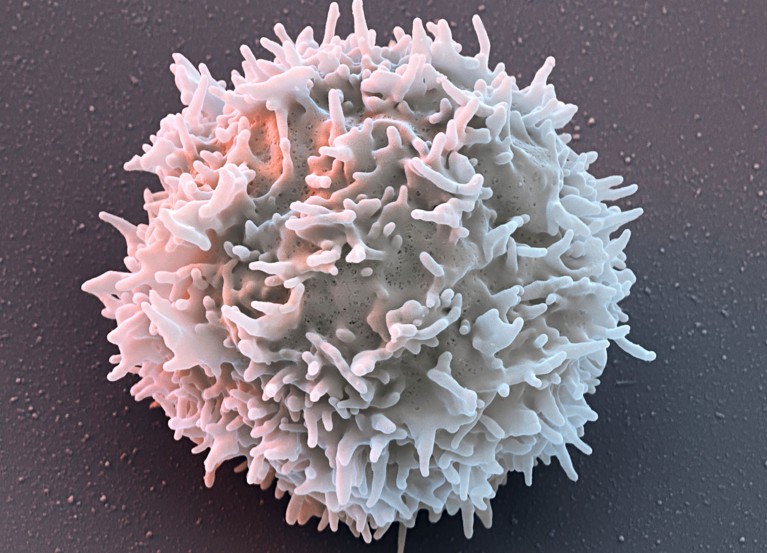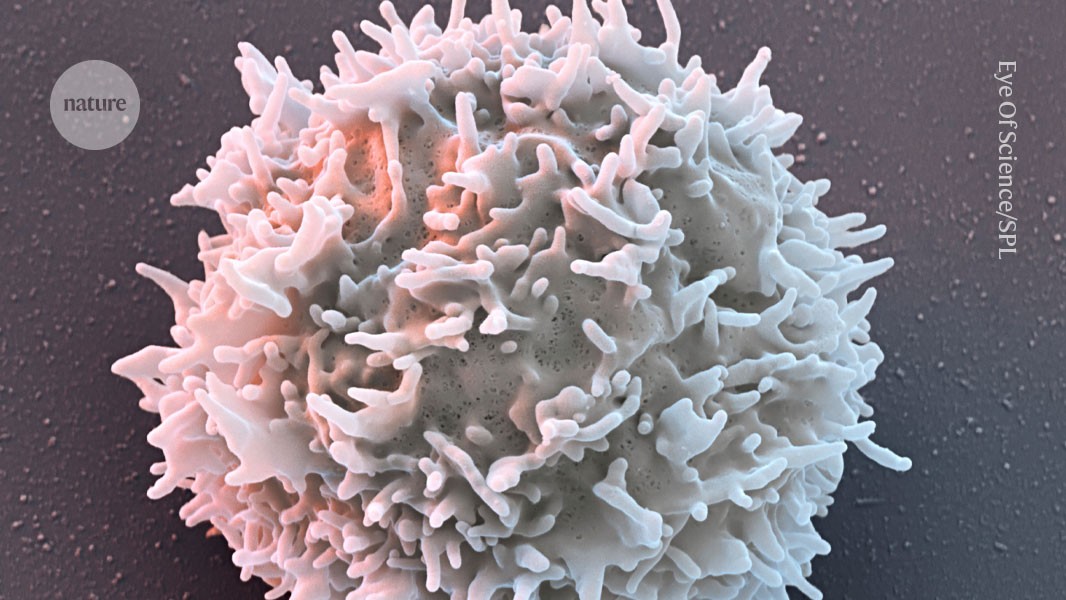
CAR T cells (pictured) are being used to treat autoimmune diseases.Credit: Eye Of Science/Science Photo Library
Engineered immune cells are being used to successfully treat people with a range of debilitating autoimmune conditions, such as ulcerative colitis, rheumatoid arthritis and lupus. Researchers say positive results from around a dozen studies over the past three years suggest CAR-T-cell therapy could eventually be used treat any disease in which the immune system attacks the body.
CAR-T-cell therapy exploits the immune system’s T cells that fight off infection: these cells are collected from a person and tweaked to produce proteins called chimeric antigen receptors. They are then reintroduced into the body to target antigens expressed by B cells, another type of immune cell. In autoimmune disorders, these B cells make antibodies that attack the body’s own healthy tissues.
The use of the therapy for immune conditions has exploded since 2021, when a 20-year-old woman in Germany with severe lupus became the first person with an autoimmune disorder to be treated with CAR T cells1. Clinician–researcher David Simon, who was involved in that treatment2, says the CAR-T therapies have since entered phase I and II clinical trials for autoimmune conditions including systemic sclerosis, myositis and rheumatoid arthritis. Phase III trials are also under way for lupus and myasthenia gravis, a condition that causes weakness in the muscles that are used to breathe, swallow and see.
Simon, who focuses on rheumatoid arthritis at the Charité University Hospital in Berlin, says people in CAR-T-cell therapy trials for rheumatoid arthritis and lupus seem to be ‘cured’. “They lose their autoantibodies which trigger the disease, and they don’t have any symptoms anymore,” he adds. “This is something totally new which we didn’t observe before.”
CAR-T-cell therapy has become a routine treatment for several types of cancer since it was first approved to treat blood cancers in 2017.
A new frontier
Ulcerative colitis, a condition that affects the colon and causes stomach pain, ulcers and bloody diarrhoea, is one of the latest diseases in which CAR-T-cell therapy has shown promise.
In September, gastroenterologist Markus Neurath and his colleagues at the University Hospital Erlangen in Germany, reported using CAR T cells to treat a 21-year-old woman with ulcerative colitis3. After the treatment, she showed signs of remission that persisted for 14 weeks, no longer needed medication and could return to work. “The result was quite amazing,” adds Neurath. His team plans to test the treatment in a few more people before proceeding to a controlled clinical trial involving many individuals.
Earlier this year, Bing Du, an immunologist at East China Normal University in Shanghai, and his team published the results of a CAR-T pilot study using immune cells from a donor to treat drug-resistant lupus4. Donor-derived cells could act like a generic version of CAR-T treatment that could be mass-produced, cutting manufacturing time and lowering costs5. Last year, Du was also involved in a world-first study of bioengineered and modified immune cells from a donor for the treatment of two rare and severe autoimmune diseases6.
As part of the latest study, four women with a form of lupus that affects multiple organs received chemotherapy to reduce levels of their white blood cells, followed by an infusion of donor-derived CAR T cells. After three months, the women no longer experienced symptoms such as arthritis, swelling of blood vessels and alopecia, and one was in remission and no longer needed any medication. The other three women received low-dose steroids as a maintenance therapy.
The results of the trial were “much better than we could imagine”, says Du, and might be due to CAR T cells triggering the total depletion of dysfunctional B cells that attack the body’s tissues. “The immune system had to reset not only B cells, but also the rest of the immune system,” he adds, potentially allowing new, healthy B cells to replace the dysfunctional cells.


